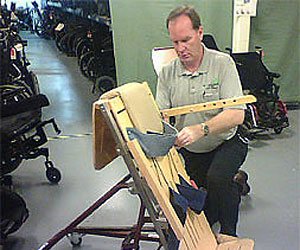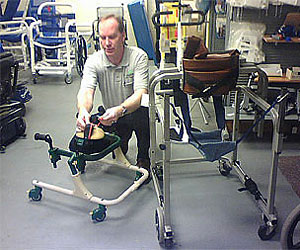Beyond Used Disability Equipment
 Having lived in England for six of the past 10 years, I became familiar with Children’s Centers, “one-stop shops” for young children and their families offering services from daycare and parenting classes to therapy and medical counseling all under the same roof.
Having lived in England for six of the past 10 years, I became familiar with Children’s Centers, “one-stop shops” for young children and their families offering services from daycare and parenting classes to therapy and medical counseling all under the same roof.
So it was a pleasant surprise to discover the NEAT (New England Assistive Technology) Center at Oak Hill in Hartford, Connecticut. Founded in 1999, NEAT is doing something similar in their community for those with disabilities of all types.
NEAT is a unique resource for the local population with disabilities and all those connected to it, offering training, workshops, specialized summer camps, evaluations, business and employment trainings, and a wide variety of other services including the Equipment Restoration Center.
A former swimming pool complex from the Oak Hill School for the Blind, NEAT’s Equipment Restoration Center, run by Don Hoerman and his small staff, accepts and repairs donated pieces of used adaptive equipment from all over New England. In an average year, the Equipment Restoration Center receives approximately eight to nine thousand phone calls and emails regarding donations. Between 1500 and 1800 pieces of adaptive equipment are donated to the Center yearly, and about 1000 pieces go out again to domestic end users, while the rest are passed on to the international community.
 All donated equipment is first treated to the Center’s wheelchair washing machine, designed to scrub and sanitize wheelchairs and other large items. Any equipment too battered to be refurbished is then stripped for parts that can be used to restore other similar equipment. Local high school students who volunteered at the Center assembled large wooden drawers for storage of various parts and wheelchair footrests. Larger pieces of equipment are organized on warehouse shelving by type and manufacturer.
All donated equipment is first treated to the Center’s wheelchair washing machine, designed to scrub and sanitize wheelchairs and other large items. Any equipment too battered to be refurbished is then stripped for parts that can be used to restore other similar equipment. Local high school students who volunteered at the Center assembled large wooden drawers for storage of various parts and wheelchair footrests. Larger pieces of equipment are organized on warehouse shelving by type and manufacturer.
Outside the Center, three sheds also constructed and painted by local high school students store restored equipment not used by the local community. Once full, partner organizations are contacted to arrange transfer of the equipment overseas where adaptive aids for people with disabilities are virtually nonexistent.
In this manner, not only does a wide range of equipment become more affordable (items are sold directly or in partnership with local dealers, at no more than 50% of the original cost) but used, durable equipment can continue to be utilized instead of filling dumpsters. Local qualified equipment supply companies who assist in the re–furbishing and fitting process assure that any item received through NEAT is medically appropriate and in sound condition. As many of our customers know, Rifton items are built to last: I was pleased to see Rifton products as old as twenty years being restored to full functionality.
Many programs around the country offer similar services. Inspired by the visit to NEAT, I put together a list of other organizations that may accept donations of used, yet usable, adaptive products. These green and giving efforts can improve the lives of people with disabilities both at home and around the world while setting a new expectation of just how adaptable and durable equipment should really be.
Don Hoerman, ATP
860-286-3106
neatrestore@neatmarketplace.org
Back to Top